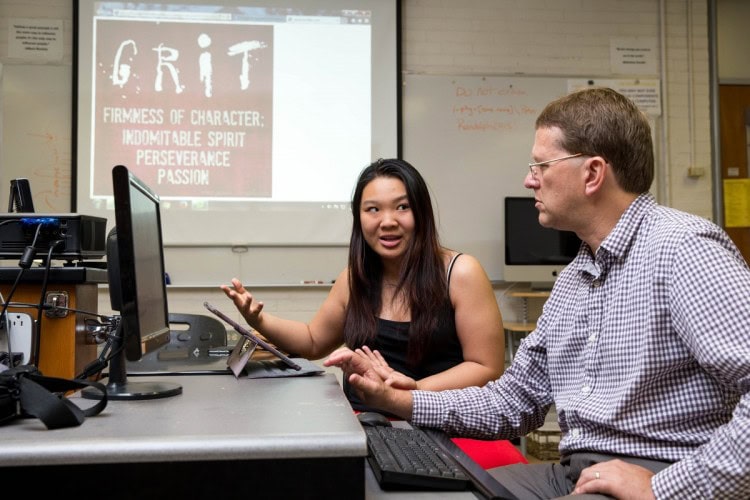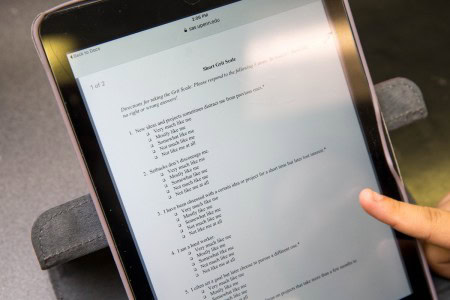Making the SUPER program SUPERB

Zhe Chen ’17 and physics professor Peter Sheldon discuss their research on the SUPER program.
Since 2010, the Step Up to Physical Science and Engineering at Randolph (SUPER) program has helped the College recruit, train, and retain the nation’s future scientists. This summer, Zhe Chen ’17 is helping SUPER become SUPERB.
Chen is analyzing the effectiveness of each aspect of the four-year program for science, technology, engineering, and math students for her Summer Research project, “Step Up to Physical Science and Engineering at Randolph, Phase B (SUPERB).” She is working with physics professor Peter Sheldon, who founded SUPER, to create a series of surveys that will be administered to students and alumni of the program. The surveys contain questions about mentor expectation and satisfaction, as well as College and major engagement.

Zhe Chen ’17 demonstrates a Grit Scale survey that will be used in research about the SUPER program.
An ongoing analysis of the program is one of the stipulations for a $1 million grant the College received from the National Science Foundation (NSF) earlier this year. Most of the funding will go toward scholarships and innovative programs designed specifically to help Randolph science students succeed. This is the second time the NSF has awarded funding to Randolph in support of SUPER. In 2013, Randolph was awarded a $600,000 grant to expand the program.
“We’re looking at some additions and changes, once we see what has and hasn’t worked well,” Sheldon said. “The NSF is really excited about our mentor program, so we know we need to restructure it and put more of a focus on those aspects.”
A SUPER student herself, Chen especially enjoyed the summer transition program, which is a two-week “science boot camp” that helps incoming SUPER students better acclimate to college life and classes before the fall semester begins.
“They put us all in the same hall, in the same dorm, and we would work together on homework since we were in all the same classes,” Chen said. “It’s a community within a community, and that’s what I like most about SUPER.”
A physics and business major, Chen said she chose to attend Randolph in large part because of the SUPER program, but also because she was impressed by its strong liberal arts curriculum.
“I liked the fact that if I changed my mind about majoring in physics I would have had other options,” Chen said. “I haven’t changed my mind, but it was nice to know the option was there.”
Sheldon has enjoyed watching students like Chen thrive in science and math thanks to SUPER—and the additional funding from the NSF. “It means a lot to me that NSF has funded this project an additional million dollars,” he said. “It encourages me to keep pursuing programs that encourage student success, and it shows that we are doing things right. It promises that we are going to be able to help a large number of students succeed in the sciences over the coming years.”
Tags: business, Grant & Research News, grants, mathematics, National Science Foundation, Peter Sheldon, physics, science, student research, summer research, Summer Research 2016, SUPER, SUPERB, Zhe Chen
